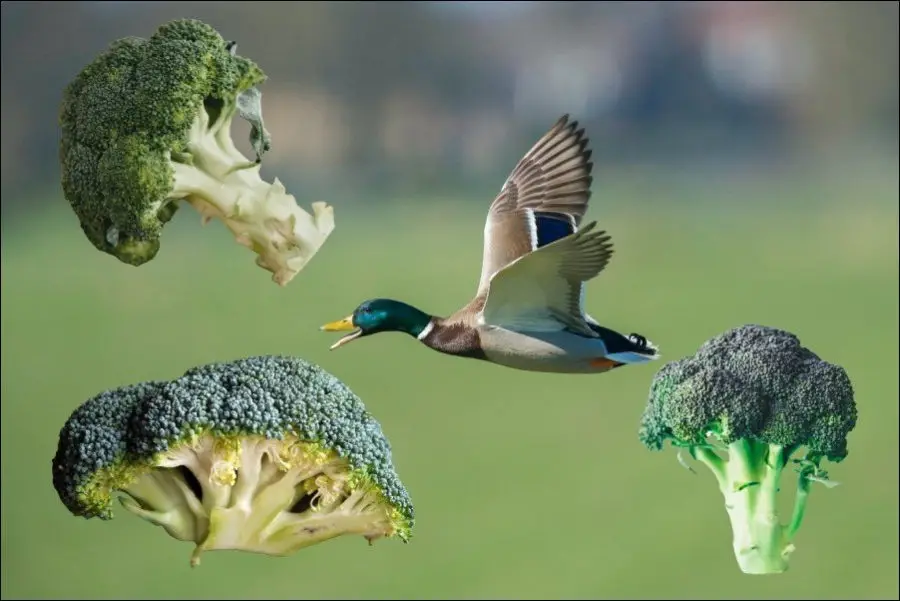
People have mixed feelings about broccoli. Some love it, and others hate it. Usually, broccoli grows on you, and you start to like it when you grow up. There is something about that strong green collar, different textures, and taste that puts young off. There are, however, individuals with other opinions.
Ducks can and love to eat broccoli. Ducks like to eat both stalk, stems, leaves, and crown of the broccoli. Broccoli provides a good amount of nutrients which is good for them. It doesn’t matter if it’s raw or cooked – the ducks will eat it as long as it is cut into smaller pieces.
Broccoli should be a staple food in every duck’s diet since it provides many different beneficial vitamins and minerals and a low amount of calories. However, since it comes with a small number of calories, it’s important not to let it take up too much space in the stomach.
Can ducks eat broccoli?
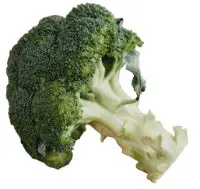
Ducks can eat broccoli. Broccoli doesn’t have any toxic features and only comes with benefits. Broccoli has got a bad reputation due to its high amount of fiber, causing a bloated stomach. Ducks don’t seem to mind, and after a few weeks with a higher amount of fiber in the diet, the body adapts.
If you decide to add broccoli to your duck’s diet, you must serve it in smaller pieces—a duck will not eat whole broccoli in its entirety. Before serving my ducks, I clean them and put the broccoli in a food processor. The results are small bits that fit in the duck’s mouth and can easily be added to their regular pellets. If the broccoli has been in the freezer, I let them defrost first.
Can ducklings eat broccoli?
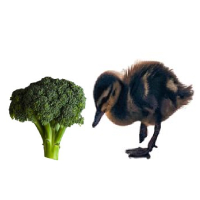
Ducklings shouldn’t go too far away from their regular feed. However, 10% of the calories can come from another source other than their duckling feed. Since broccoli is low in calories, it is a great addition. Feel free to add broccoli to your duckling’s diet. Ducklings require much protein when growing up, and broccoli is a great resource for just that. Ensure you serve the broccoli in moderation as well as in smaller pieces. A food processor is an important tool, so the ducklings don’t get anything stuck in their throat.
Do ducks like broccoli?

From what I’ve gathered with my ducks, they seem to like broccoli a lot, especially when the broccoli is placed in water for them to eat. I haven’t noticed if they prefer raw or cooked broccoli the most. But both variations disappear very quickly.
Beyond broccoli, ducks also love other vegetables. Ducks need vegetables in their diet. However. there are some vegetables ducks shouldn’t eat. Check out what vegetables ducks can and can not eat here.
Can ducks eat raw broccoli?
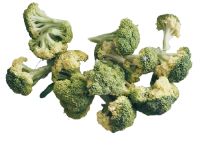
Ducks can eat raw broccoli. Raw broccoli actually has more vitamins and minerals than cooked. In the cooking process, some nutrients are removed. Broccoli may lose up to 50% of the Vitamin C content when cooked.
If your goal is to provide the ducks with vitamins and minerals through food, you may want to consider not cooking the broccoli before serving. Instead, cut the broccoli using a food processor into smaller pieces. That way, the ducks can still eat the broccoli without a problem and still keep the original nutrients.
Can ducks eat cooked broccoli?
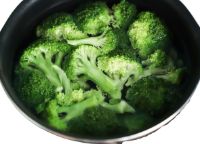
If you have any cooked broccoli leftovers, they are magnificent to offer to your ducks. Ensure the broccoli isn’t covered in spices, sauce, or any other seasoning. Plain, cooked broccoli is excellent to feed to ducks as part of their daily diet. However, raw broccoli contains more nutrients than cooked. Although, cooked is easier for ducks to consume since it’s less stiff. You will need to cut the broccoli up into smaller pieces either way. But it’s more important when the broccoli is raw.
Is raw broccoli better than cooked for ducks?
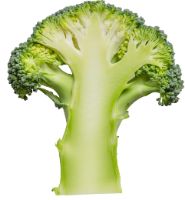
This is a dilemma for those who give broccoli to their ducks—simplicity vs. Nutritional value. Raw broccoli contains more nutrients than cooked but requires to be more chopped up than cooked. While cooked broccoli is easier for them to swallow, it does have fewer amount of nutrients.
I’m faithful to my food processor and use it to chop up raw broccoli almost daily. If I have leftover broccoli from yesterday’s dinner, I will give it to the ducks. Otherwise, I always go for raw. The purpose of having animals is to give them the best opportunity to have a great life.
Ducks like to eat fruit now and then. There are some fruits to avoid feeding them. You might be surprises by what fruits you can and can not give to ducks.
Can ducks eat broccoli stems?
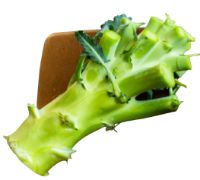
Ducks can eat the broccoli stems. The stems hold the crowns of broccoli and also contain a lot of nutrients. I usually don’t cut off the stems and, instead, keeping them intact with the crown. That way, the broccoli floats easier, making the crown a small buoy.
Can ducks eat broccoli stalks?
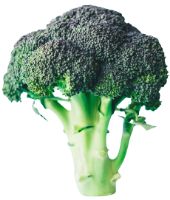
Ducks can definitely eat the stalks of broccoli. Most people throw away the stalk, but in fact, it’s quite good and packed with important nutrients. Unless you want to eat the stalk yourself, you can feed the broccoli stalk to the ducks. However, it would be best if you cut it into smaller pieces. My best advice is to cut the stalk in half, make it a half-moon shape, and chop it into smaller pieces. That way, the risk of the duck choking is decreasing.
Did you know ducks can eat many human foods? But there are some they shouldn’t eat. Learn which foods you should never feed to ducks.
Can ducks eat broccoli leaves?
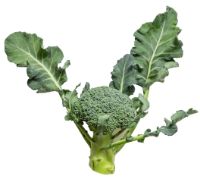
Both humans and ducks can eat broccoli leaves. The leaves are full of beneficial vitamins and minerals such as fiber, Vitamin C, Vitamin K, Iron, and Potassium. If you grow the broccoli yourself, you know the leaves can be quite large. If you don’t want to use the leaves yourself, you will need to chop them into smaller pieces first. I would recommend tearing them instead of cutting them. That way, the fiber structure remains intact, and it will taste better.
Safe ways to offer broccoli to your ducks
There are a few ways to offer broccoli to ducks in a safe way. I will share my favorite ways that both are simple and safe and don’t take long.
1. Cut them by hand and put in water
If you don’t know what to do and want to relax the mind for a while, this is an excellent way. You only need to wash the broccoli and then cut off the broccoli stems. In moments you’ll have many small broccoli flowers. Try to avoid making them bigger than your thumb. When you are done, you can throw the bouquets into a bucket of water and watching the ducks fishing.
2. Mix them and serve with the pellets
This is the way I often feed my ducks. I bring out my digital scale and weigh in the correct amount. Add them to the food processor. Blend for some seconds until every broccoli is small enough. Mix them with the pellets for the day.
3. Mash them with potatoes
Sometimes when I have both leftovers of broccoli and potatoes, I make mashed broccoli and potatoes. If I have something else like carrots, I use that too sometimes.
How to make mashed broccoli and potatoes for ducks.
- Boil the broccoli and peeled potatoes for 20 minutes
- Don’t use any spices like salt or pepper.
- Save the water.
- Dry them off and move them into a bowl
- Use an electric mixer to make a puré.
- If it doesn’t stick or make a puré add some of the cooking water.
- Done!
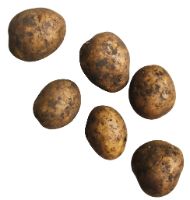
Do not add any butter or milk to the mix if your intentions are the ducks should eat it.
Ducks can eat potatoes too. Do you want to know more about feeding potatoes to your ducks?
Ducks will benefit from having fodders in their diet. Some fodders are excellent for ducks to eat, and some are to avoid. Check out what fodders you can feed ducks.
How often can I feed broccoli to ducks?
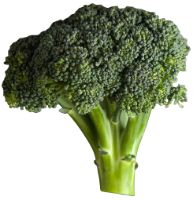
Ducks need a certain amount of calories, macronutrients, vitamins, and minerals. It can be hard to ensure your ducks receive everything they need. The best thing you can do to make sure of that (despite contacting a veterinarian) is to give the ducks a mixed diet with foods from multiple sources. Since broccoli is a cheap vegetable with low calories but relatively has many nutrients, I feed my ducks daily with it.
How much broccoli should I feed my ducks?
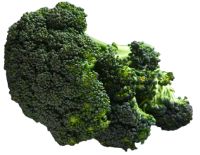
It’s hard to answer exactly how much broccoli you should feed your ducks. The important thing is to ensure the ducks receive all mandatory nutrients and calories for the day. If you have control over that, you are fine. I feed my ducks with pellets which include many of the required nutrients in a duck’s diet. I supplement with foods, which have the nutrients the pellets are lacking. My ducks receive 100g of broccoli each per day. That’s around 40 calories each.
Ducks are omnivores. That means they eat both vegetables and other animals. Do you want to know what other animals ducks eat? Check out the resource with over 70 examples I wrote here.
Health benefits from feeding broccoli to ducks?
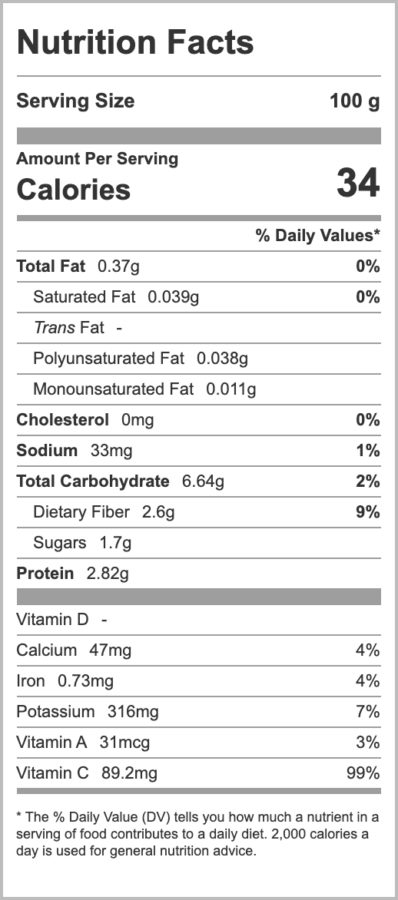
Broccoli is rich in both water-soluble and fat-soluble vitamins. It also has a lot of minerals too.
Broccoli has Vitamin A, Vitamin B1, Vitamin B2, Vitamin B3, Vitamin B4, Vitamin B5, Vitamin B6, Vitamin B9, Vitamin C, Vitamin E, Vitamin K, Calcium, Iron, Phosphorus, Magnesium, Potassium, Manganese, Copper, Sodium, and Zinc.
Vitamin A in broccoli for ducks
Vitamin A is a fat-soluble that is found in most foods. Vitamin A is important for vision, the immune system, and reproduction.
Vitamin B1 in broccoli for ducks
Vitamin B1 enables the body to use carbohydrates as energy, which is great since most broccoli is carbohydrates. It also helps with the nervous system, brain, muscles and stomach, and intestines.
Vitamin B2 in broccoli for ducks
Vitamin B2 helps to break down carbohydrates, fats, and protein. B2 is also called Riboflavin which turns carbohydrates into glucose.
Vitamin B3 in broccoli for ducks
B3 or Niacin is essential in the duck’s diet. Niacin helps to control LDL cholesterol and increase HDL cholesterol.
Vitamin B4 in broccoli for ducks
Vitamin B4 is important in protein synthesis, which is the process of creating protein molecules.
Vitamin B5 in broccoli for ducks
Vitamin B5 is necessary for making blood cells. With other B Vitamins, it helps to convert food into fuel.
Vitamin B6 in broccoli for ducks
Vitamin B6 helps the central nervous system and metabolism. It also helps to produce neurotransmitters, such as serotonin and dopamine.
Vitamin B9 in broccoli for ducks
Vitamin B9 is also called Folate. Folate helps to build red blood cells. A deficiency in Folate is called anemia.
Vitamin C in broccoli for ducks
Vitamin C is important in the body to grow and repair body tissues. It helps with lowering the risk of cardiovascular diseases and also prevent iron deficiency.
Vitamin E in broccoli for ducks
Vitamin E is a fat-soluble nutrient and acts as an antioxidant. Vitamin E helps to protect cells from damage caused by free radicals.
Vitamin K in broccoli for ducks
Vitamin K is a group of fat-soluble vitamins. A deficiency can cause bleeding and also reduce bone strength.
Calcium in broccoli for ducks
Calcium does many things in the body. Calcium helps to carry messages from the brain to different body parts. It’s also important for the blood to be able to circulate.
Iron in broccoli for ducks
Iron is essential for blood production in the body. Most iron is stored in the red blood cells, which are called hemoglobin. Hemoglobin transfers oxygen from the lungs to different body parts.
Phosphorus in broccoli for ducks
Phosphorus helps to keep the bones strong. Deficiency in phosphorus may cause a lack of appetite, fragile bones, fatigue, and weight change.
Magnesium in broccoli for ducks
Magnesium supports muscle and nerve functions, as well as energy production. Magnesium also helps with sleep.
Potassium in broccoli for ducks
Potassium helps nerves function and muscles contract. It also helps regulate sodium’s harmful effects on blood pressure.
Manganese in broccoli for ducks
A deficiency of manganese may show in the form av poor bone growth and skeletal defects. The duck may also grow slower than expected. It may also decrease fertility.
Copper in broccoli for ducks
Copper, as well as iron, enables the body to form new red blood cells. It also helps with nerve- and immune functions.
Sodium in broccoli for ducks

Sodium is used in the body to control blood pressure and blood volume. Sodium works both as an electrolyte and mineral. It helps the fluids both inside and outside the body’s cells.
Zinc in broccoli for ducks
Zinc keeps the immune system strong and is important for cell function. A deficiency in zinc may lead to a weakened immune response.
Conclusion
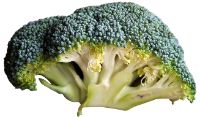
Ducks can eat broccoli as long as it is cut into smaller pieces or mashed in some way.
Ducks can eat both raw and cooked broccoli. However, they will most benefit from raw since some nutrients disappear when cooking them.
Ducks and ducklings both love to eat broccoli.
Ducklings can eat broccoli but shouldn’t exchange their regular duckling’s pellets diet for other food yet.
Ducks can eat stems, stalks, leaves, and crowns of broccoli. Ensure you cut the harder and bigger parts into tiny pieces before serving, especially if the broccoli is raw. Otherwise, there may be a choking hazard.
Safe ways to feed broccoli to ducks:
- Cut them and put into water letting them float around.
- Put broccoli in the food processor and serve with their pellets.
- Make mashed broccoli and potatoes and serve.
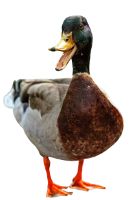
You can feed broccoli daily and making it a staple in their diet. Ensure the ducks receive all need nutrients daily without feeding them too many calories.
Broccoli has a ton of nutrients. Broccoli has Vitamin A, Vitamin B1, Vitamin B2, Vitamin B3, Vitamin B4, Vitamin B5, Vitamin B6, Vitamin B9, Vitamin C, Vitamin E, Vitamin K, Calcium, Iron, Phosphorus, Magnesium, Potassium, Manganese, Copper, Sodium, and Zinc.
